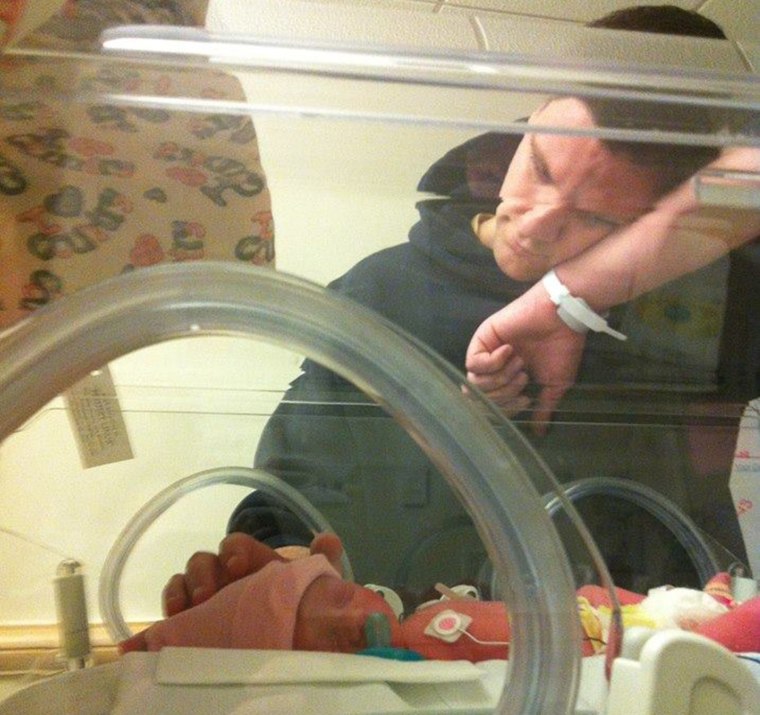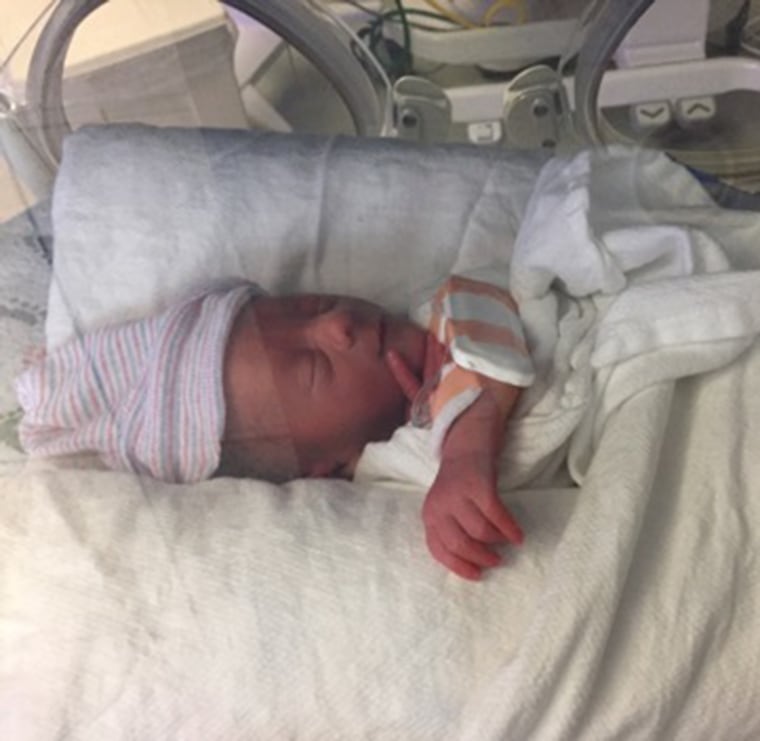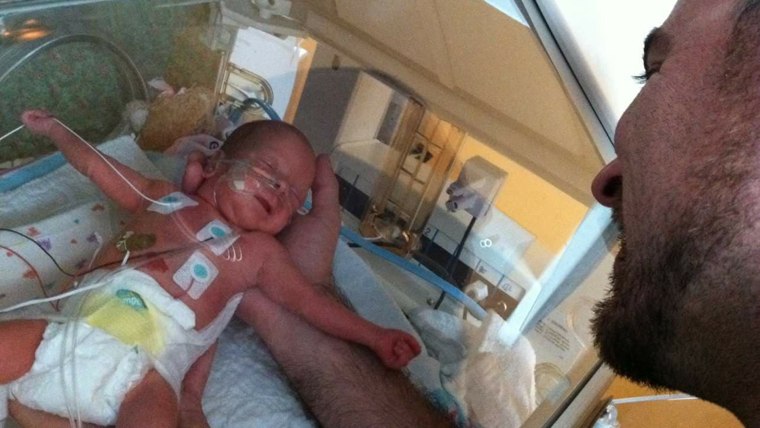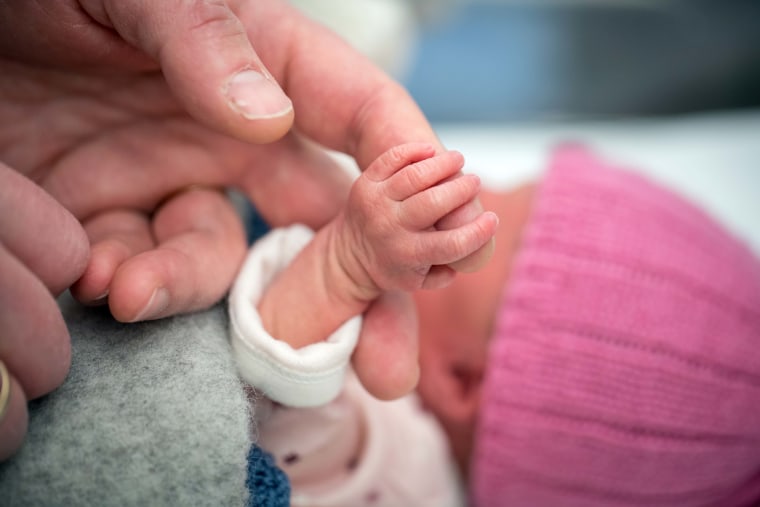World Prematurity Day is Nov. 17: One in 10 babies are born prematurely in the U.S., according to the March of Dimes.
Scientists don't always know what causes premature birth, and early birth can cause life-threatening complications, the March of Dimes says, as well as lifelong medical issues.
For parents, having a baby born prematurely can be terrifying, but parents are not alone.
What to know if your baby is premature
Chris Murphy was one of those parents: His son, Remy, was born prematurely. After an uneventful pregnancy, Remy came early with multiple health problems and needed surgery in his first 24 hours of life to survive.
“I wish I would have had better insight into how difficult it was going to be,” Murphy said. “You never really can prepare for a preemie. It just kind of happens."
Murphy and other parents offered TODAY.com advice that they wish they'd known before their child was born prematurely.

Prematurity rule 1: Ask for help right away
“The NICU is an amazing place and they do wonders there. It is also a very scary and traumatizing place,” Murphy said.
Murphy thought he could handle the stress alone. But watching Remy fight for his life in the NICU for four months felt too overwhelming. Murphy said he started drinking, gained weight and lashed out at his family before asking for support.
“I should have gotten a therapist right away,” he said. “No matter how strong you think you are mentally, you will break down.”
Prematurity rule 2: Ask lots of questions
When Steve Michener’s wife, Carissa, delivered their daughter at 24 weeks pregnant, he felt scared. His daughter, Claire, weighed 1 pound, 9 ounces, and her skin was so thin he could see her heart beating through her chest.
During her two months in the NICU, he often thought Claire was dying but felt confused. He wished he would have pestered the doctors more.
“We didn’t know what questions to ask,” the dad from Ellwood City, Pennsylvania, told TODAY. “I was definitely out of my league.”
Prematurity rule 3: Expect different answers
When Mike Ryan’s wife, Natalie, gave birth to their daughter Juliet at 33 weeks, the couple worried. Their questions often received conflicting answers from doctors.
“That was the biggest frustration,” Ryan, who lives in Pittsburgh, told TODAY. “Each doctor has a different opinion and that is why things changed a little bit daily.”
But the couple realized that their doctors knew what was best.
“We said ‘Let’s trust the doctors and trust what they are saying. This is their profession. They know what they are doing better than us,’” he said.

Prematurity rule 4: Sometimes, go with your gut
Daniel Corbin’s son, Noah, was born 5 weeks early and he, too, felt frustrated by the varied opinions he and his wife, Meghan, heard. While they worried about taking advice from the wrong person, they soon realized that they knew what their son needed.
“Take into account some of various subtly conflicting messages from the doctors … and go with your gut,” Corbin, from Pittsburgh, told TODAY.com.
Prematurity rule 5: Finding child care is hard
After bringing Claire home after two months in the NICU, Michener and his wife had to return to work. But they weren’t sure who could watch Claire, who was still dependent on oxygen. Their local teen babysitter wasn’t qualified and even experienced nannies felt hesitant.
“Your average babysitter is either not qualified or comfortable,” he said. “Who do you trust to watch your child?”
Luckily, the couple found an older woman who didn’t balk at Claire’s medical needs.

Prematurity rule 6: You won’t break your baby
When Brody Gilbert’s son, Cooper, was born at 32 weeks he only weighed 3 pounds 2 ounces. Gilbert worried holding him could hurt him.
“I would have loved to try something out in a risk-free environment,” Gilbert, of Monongahela, Pennsylvania, told TODAY. “It was definitely intimidating.”
When the nurses explained how skin-to-skin contact would help Cooper thrive, Gilbert knew he had to hold his tiny son.
“I was excited in a nervous way,” he said.
Michener had a similar realization about holding his daughter: “They are not as breakable as I always thought.”
Prematurity rule 7: Big emotions are normal
Chris Murphy struggled with feeling helpless and scared.
“I was on a rollercoaster of emotion,” he said. “I wish I would have had a better insight into … how difficult it was really going to be.”
Brody Gilbert grappled with his feelings, too.
“I have never felt more powerless in my life,” he said. “Your emotions do get the best of you.”
And Daniel Corbin experienced doubts: “I didn’t know what I was supposed to be doing.”

Prematurity rule 8: It gets better.
“There’s a light at the end of the tunnel,” said Murphy.
Even though Remy’s had 15 surgeries, including a stent in his brain, he is a happy, active kid.
When he was almost 6 months old, Cooper weighed 17 pounds and was “perfectly healthy, happy,” his dad said.
Claire taught herself how to ride a bike and makes her parents nervous because she’s so “physically strong and strong-willed.”
Noah is thriving.
And Juliet graduated pre-kindergarten — dressed as Batgirl.
This story was first published on June 12, 2018, and has been updated.
